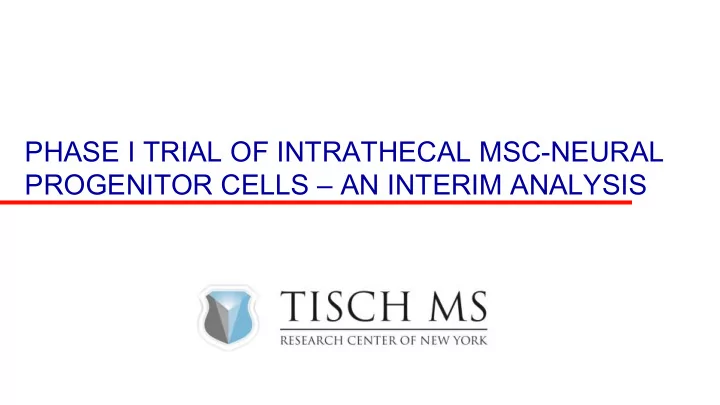

PHASE I TRIAL OF INTRATHECAL MSC-NEURAL PROGENITOR CELLS – AN INTERIM ANALYSIS
Cell Source - MSC-NPs Autologous EGF/bFGF Bone Marrow nestin+ MSC MSC-NP MSC-derived plastic adherent mesenchymal neural progenitors stem cells
Phase I Open Label Clinical Trial Study aim: Safety and Tolerability of autologous IT MSC-NP Dose: 3 injections of up to 10 million cells q 3 months Enrollment: 20 MS patients (14 F; 6 M) with ‘stable’ disability, EDSS 3.5 to 8.5; 16 SPMS; 4 PPMS ; Ages 27-65 Primary Safety outcomes: Clinical, MRI, and lab testing, 2 year follow-up Secondary Efficacy outcomes: EDSS, MSFC, EPs (VER, ABER, SER), QOL urodynamic studies
Unique Aspects of our Study • Use of MSC-NP cells • IT route of administration • Multiple dosing • Delivery of MSC-NPs in culture to patient within 30 minutes of harvesting. Minimizes physiological stress of freeze-thawing and maximizes cell viability
Adverse Events • No safety issues to date • No serious adverse events • Minor adverse events: 80% of patients experienced at least one transient headache (< 2 days post-RX) 20% report transient fever (less than 100 o F -first 24 hours) One incident of post-spinal headache • DSMB/IRB/FDA have approved continuation of Phase I study
Results - Efficacy Parameters • ≥ 0.5 point improvement in EDSS score • >20% improvement in 25 foot timed walk • >20% improvement in nine hole PEG test • >20% increase in bladder capacity • Abnormal à Normal Visual Evoked Potentials
10/15 Patients Improved % Improvement of % Increase bladder Study 25 ft walk capacity EDSS EDSS subject Other Area of Improvement baseline post-tx (>20% considered (>20% considered number significant) significant) 03 3.5 1.5 23.3% 10.9% D/C bladder meds; abnormal à normal VEP, D/C Bioness 04 8.0 8.0 n/a 523.4% D/C bladder meds 05 7.0 6.5 n/a 201.5% n/a 06 8.0 8.0 n/a 10.9% 58.3% improvement in nine hole peg test (>20% considered significant) 07 6.0 5.5 17.2% 10.5% D/C unilateral cane 08 7.5 7.5 n/a 69.5% n/a 10 7.5 6.5 Unable à Able 40.3% D/C bladder meds; scooter à walker 12 6.0 5.5 1.1% -7.0% D/C unilateral cane 14 5.5 4.0 57.0% n/a 15 6 5.5 29.2% n/a D/C hip flexor sling, Bioness, and cane
Summary – Interim analysis • MSC-NP IT use is well tolerated and safe in the short term • First MS “stem” cell trial to show functional improvement in majority of treated patients • It appears that less disabled patients do better as 5/6 patients with EDSS of 6.5 or less improved compared to 5/9 patients with EDSS >6.5
Next Steps • Complete Phase I 20 patient study in 2016 • Planning a double-blind, placebo-controlled, multi-center, phase II study designed to determine efficacy (FDA-approved)
Acknowledgements Violaine Harris, PhD James Stark, MD Tamara Vyshkina, PhD Sarah Yarmosky, RN Valentina Stefanova, MS Stacey Ketcham, RN Leslie Blackshear, BA Damiel Foundation Mason Diamond, DDS Mocasian Lake Foundation Gloria Joo, BA
Recommend
More recommend